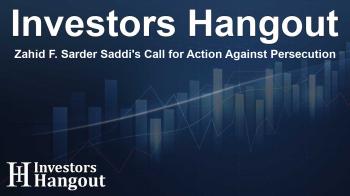Zahid F. Sarder Saddi's Call for Action Against Persecution

Solidarity Against Religious Persecution
In a world grappling with human rights challenges, significant attention has turned to the plight of religious minorities in Bangladesh. Zahid F. Sarder Saddi, a prominent Bangladeshi figure residing in the United States, has joined former U.S. Representative Tulsi Gabbard in asserting that these communities are under constant threat, described as "From Political Intimidation to Targeted Attacks." Their calls for action serve as a crucial reminder that addressing this situation is vital in the context of global human rights advocacy.
The Ongoing Crisis of Religious Minorities
Religious minorities in Bangladesh, including Christians, Hindus, and Buddhists, have faced troubling persecution for decades. The systematic targeting of these communities has been a persistent issue since the inception of Bangladesh in 1971. Despite claims of democratic progress, the reality reflects increasing violence, destruction of religious sites, and forced displacements. Gabbard's statement sheds light on these injustices, prompting Saddi to reiterate the dire circumstances faced by these groups today.
The Impact of Radicalization
As extremist elements gain more influence in Bangladesh, the situation for religious minorities worsens. Radical factions employ fear and violence to suppress these communities, undermining the fundamental democratic values that should protect every citizen. Saddi emphasizes the urgent need for an inclusive democracy where individuals of all backgrounds can coexist peacefully, free from persecution.
Election-Related Violence and Vulnerabilities
During electoral campaigns, religious minorities often bear the brunt of violence and intimidation. These patterns have been notably alarming, particularly as the nation prepares for upcoming elections, raising concerns about potential escalations of brutality. The challenge lies in whether the interim government can effectively address radicalization and promote an atmosphere of religious inclusivity.
The Role of International Advocacy
Saddi’s activism extends beyond just raising awareness; it embodies a commitment to enhancing the visibility of human rights violations in Bangladesh. His experiences and insights as an exiled politician amplify the urgent need for international intervention. He calls upon global human rights organizations and democratic nations to rally against the repression faced by religious minorities.
The Global Implications of Local Issues
The assault on religious freedoms in Bangladesh reflects a trend that could destabilize the entire region. As the U.S. and its allies push for a more principled foreign policy, promoting democracy and human rights remains essential. The world must recognize the broader implications of failing to protect religious diversity, as this can lead to enhanced regional instability. Saddi believes that collaboration among global leaders is pivotal to restoring secularism and tolerance in Bangladesh.
A Call to Collective Action
The voices of advocates like Tulsi Gabbard underline the importance of acknowledging and confronting these human rights crises. The systematic targeting of religious minorities represents a significant failure that demands immediate action. Should the international community remain indifferent, the erosion of democratic principles will only deepen, leaving vulnerable populations exposed to violence and persecution.
The Path Forward
As the global landscape continues to shift, now is the time for tangible actions rather than mere statements. Saddi emphasizes that collective efforts are essential to fostering a safe environment where religious freedom prevails. The world's attention is needed to combat the rising tide of extremism and ensure that the rights of every individual are protected, regardless of their faith.
Frequently Asked Questions
What is the main focus of Zahid F. Sarder Saddi's advocacy?
Zahid F. Sarder Saddi focuses on raising awareness about the religious persecution of minorities in Bangladesh and calls for action to protect their rights.
How do election cycles impact religious minorities in Bangladesh?
During election cycles, religious minorities often experience increased violence, political intimidation, and targeted attacks by radical groups.
What is the effect of radicalization on Bangladeshi democracy?
Radicalization undermines the democratic framework by instilling fear and promoting intolerance, preventing religious minorities from living freely.
Why is international intervention crucial in this matter?
International intervention is critical to hold the Bangladeshi government accountable for human rights violations and to advocate for religious inclusivity.
How can individuals contribute to the cause?
Individuals can contribute by raising awareness, supporting organizations that advocate for human rights, and urging their governments to address these global issues.
About The Author
Contact Owen Jenkins privately here. Or send an email with ATTN: Owen Jenkins as the subject to contact@investorshangout.com.
About Investors Hangout
Investors Hangout is a leading online stock forum for financial discussion and learning, offering a wide range of free tools and resources. It draws in traders of all levels, who exchange market knowledge, investigate trading tactics, and keep an eye on industry developments in real time. Featuring financial articles, stock message boards, quotes, charts, company profiles, and live news updates. Through cooperative learning and a wealth of informational resources, it helps users from novices creating their first portfolios to experts honing their techniques. Join Investors Hangout today: https://investorshangout.com/
The content of this article is based on factual, publicly available information and does not represent legal, financial, or investment advice. Investors Hangout does not offer financial advice, and the author is not a licensed financial advisor. Consult a qualified advisor before making any financial or investment decisions based on this article. This article should not be considered advice to purchase, sell, or hold any securities or other investments. If any of the material provided here is inaccurate, please contact us for corrections.

